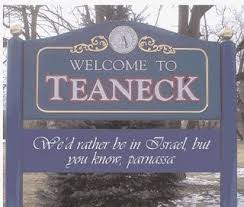 Teaneck, New Jersey, May 5 – On the date of the Hebrew calendar that marks the anniversary of modern Israel’s establishment as a state, Ezra, the hero of the eponymous Biblical narrative, expressed frustration that the Jews of that township and of North America in general were committing the identical error to that of the majority of Jews in ancient Babylonia.
Teaneck, New Jersey, May 5 – On the date of the Hebrew calendar that marks the anniversary of modern Israel’s establishment as a state, Ezra, the hero of the eponymous Biblical narrative, expressed frustration that the Jews of that township and of North America in general were committing the identical error to that of the majority of Jews in ancient Babylonia.
The book of Ezra records the efforts of its title figure to reestablish a Jewish presence and government in the Holy Land after decades of exile following the destruction of the First Temple and the wholesale removal of the Jews to Babylonia in 586 BCE. Despite his call, out of the myriad Jews living under then-Persian rule, only several thousand responded. Had the ancient Jewish community taken up his invitation, subsequent Jewish struggles with more powerful neighbors may have turned out differently, and the Second Commonwealth might never have met its ignominious end in 70 CE.
“I’m… I’m… I just don’t know what to say,” said Ezra, whose mission was sparked by a Perso-Median royal edict allowing the Jews to return to Zion. “People who claim to believe in divine orchestration of world events, who claim to believe in a the foretelling of a Jewish return to sovereignty in their historic homeland, are once again ignoring real-world developments that can only be interpreted as the fulfillment of those visions – they’re entrenching themselves ever more securely in exile,” he lamented, gesturing toward several home renovation projects in progress along Winthrop Road and Warwick Avenue.
As his book makes clear, Ezra saw Emperor Cyrus’s proclamation, allowing the restoration of populations exiled by Babylonian King Nebuchadnezzar, as a directive from God to undertake a mass return to the land of Israel. He told reporters he was flabbergasted that even more blatant indications of divine intent in the modern period were being written off by Diaspora Jews too enmeshed in the materialism and comfort of American suburbia to entertain the notion that the miraculous developments of the mid-late-twentieth century demanded anything of them.
“Homeowner after homeowner here told me he stands for the recitation of the Prayer for the Welfare of the State of Israel every Shabbat in synagogue, as if that’s all God expects,” said the prophet. “They even seem to feel they deserve extra credit for buying Israel Bonds or attending the Salute to Israel parade,” he said, shaking his head. “Then they think they have the right to demand the Israeli government do as they think. Ladies and gentlemen, put your money where your mouth is, or shut up already.”
Although the township of Teaneck accounts for many dozens of families that have moved to Israel in the last few decades, the trickle of such migrants is dwarfed by the number of those who put down permanent roots in, of all places, New Jersey, for crying out loud. The Garden State has emerged as a vibrant, attractive place for Jewish families and communities insistent on seeing Israel as “a nice place to visit” or a permanent destination “maybe when we retire,” as opposed to the focus of Jewish longing since the sixth century before the Common Era.
“It’s almost as if they don’t teach my book in schools there,” remarked Ezra.




